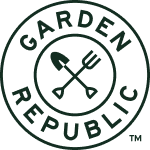Taking your first steps into the vast world of gardening, all though can be fun, can also be quite daunting! To start, there is a plethora of vegetable, herb, and flower varieties to choose from! And then you need to figure out each plant's growing needs and how to take care of them.
It's definitely an ever-growing learning experience, but it's a rewarding adventure in the long run. We've put together a few of our favorite tips that we think every gardener should have under their belt, to make your gardening journey a little bit of a jump start.
Plan Out Your Garden
Before you even buy your seeds/sprouts, you should sit down and come up with a basic plan. How much space do you have? Do you have an acre or a small apartment patio? Should you plant in a container, in the ground, or both? Where should each plant variety go? Do you have enough light? Do you need to amend your soil? How much of each plant do you want in your garden? Does a certain type of vegetable have different needs from another?
Think of this as a gardening brainstorm session! Take the time to do a little research, talk to your local nursery experts, and put some thought into planning out what you will need. This will save so some hassle and headache in the long run.
If this is your first time planting, it may be best to not go overboard with the number of plant varieties you are going to grow. Start with 12 or less, and next planting season you can start taking on more varieties as you become a more avid green thumb.
Read The Seed Packets
Each seed packet will most of the important information you will need to know to grow it the best! Most packets will contain; the germination period ( how long that seed takes to sprout). the space you need to put between that variety and the next one, how much sunlight it needs, and how long it takes to reach full maturity ( which is often when you want to harvest), the temperature that seeds needs to germinate, and depth the seeds need to be planted at.
Some seed packets may contain more or less information, it depends on the company. You can watch our video on how to read your Garden Republic seed packet by clicking here.
Create or Use Quality Soil
If you don't have good soil, you won't have healthy plants! Whether you purchase organic soil from your local nursery, or plan and create your own soil ahead of time with composting and manure, healthy, living soil is a must-have! You can read about creating healthy soil by clicking here, and about the basics of composting here.
Know Your Growing Season
Knowing the months that are best for growing in your location is important. In most areas, you can grow spring through late summer, but the exact months will vary by location. typically, you can start planting outdoors after the first frost. The Growing seasons end when the first early fall frost hits. Your local nursery should have a seasonal planting guide or almanac available or can find your plant hardiness zone here.
Light
While most plants will require full direct sunlight (6-8 hours), some will require partial sunlight (4-6 hours). But keep in mind that 8 hours of direct sunlight at 75F is alot less intense than 8 hours at 100F. If you have high summer heat temperatures, or if the plant needs in-direct sunlight, you may need to create filtered sunlight with shade cloth to keep your plants from burning.
Avoid Monoculture, and Companion Plant
If you can help it, avoiding monoculture is a great way to prevent a pest or disease from taking out an entire crop! This can be done by spreading out or alternating your garden varieties VS planting all of one variety in a single patch.
You can take this one step further, and companion plant. Certain types of plants can help other plants out. Strong smelling herbs and vegetables can help keep away pests and rodents, while others like beans legumes can help put nitrogen in the ground! One of the most well-known examples is the Three Sisters Garden, corn, beans, and squash. The corn provides stalks for the beans to grow on. The beans fix nitrogen in the ground by hosting rhizobia that take nitrogen from their air and turn it into a form that can be absorbed by the plant's roots.
On the flip side, some veggies may not like to grow next to each other. For a small example, garlic shouldn't be grown next to strawberries or parsley but is ok next to tomatoes or broccoli.
You can easily find a companion planting chart on the internet, but there is also a great book by Louise Riotte called "Carrots Love Tomatoes" that we highly recommend if you'd like to dive into the world of companion planting.
Attract Pollinators
This can also be a part of avoiding monoculture/companion planting! Planting flowers amongst veggies and herbs is a great way to make sure both humans and pollinators have food! We recommend choosing flowers that are edible or medicinal such as marigolds, clovers, cone-flower, nasturtiums, viola's, sunflowers, to name a few! Planting flowers that are native to your area is also a great way to ensure your garden is buzzing with life! Many herbs also grow flowers that are attractive to butterflies and bees.
Stay On Top Of Pests
Try as hard as you may, you are bound to end up with some type of unwanted garden pests. In small numbers, they typically won't do much harm, but can easily spin out of control and destroy your hard work! Checking your plants frequently and taking care of them right away is key! You can read about common garden pests and how to prevent and rid of them by clicking here.
Mulch
A couple of inches of natural mulch is great to keep unwanted plants from growing to a minimum. It also helps keep the soil cool, and not baking away in the hot sun, and helps retain moisture longer. A lot of cities will offer free mulch drop-offs at your home, you can do a quick internet search to find if this is available in your area.
You also can grow "cover crops" as mulch. These are typically a low-growing, edible plant variety.
Constant Hydration
Keeping your garden properly water is of great importance! You can purchase a moisture meter rather cheap from a nursery.
Keep in mind it's better to do less frequent, but deep, long watering, VS daily, light watering. If it gets extra hot you may need to water more than usual.
Although there are many, many more tips, and in-depth instructions we could give you, starting with these basic ones should keep your garden growing in the right direction!
If you have any questions about these gardening tips or needs help with your plants don't hesitate to reach out! We are happy to help! You can reach us on our website or by shooting an email to wecare@shopgardenrepublic.com.
Happy Gardening!
FEATURED GARDEN SET
EXOTIC VEGGIE STARTER KIT


